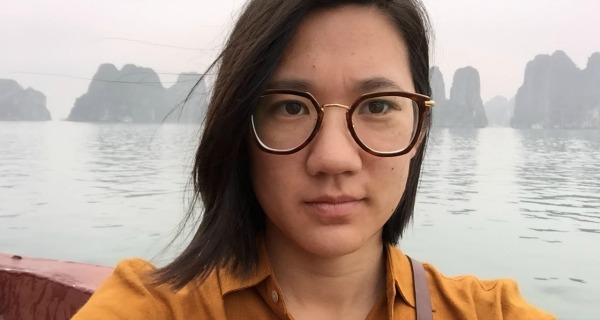
By Andre Gianfrancesco and Louis Miller
Lighthouse instructor and poet Diana Khoi Nguyen is having a busy spring: Her book Ghost Of comes out from Omnidawn next month, her Introduction to Poetry Workshop at Lighthouse starts next week, she's part of The Lighthouse Reading Show this Friday, and in her free time, she's a creative writing Ph.D student at the University of Denver. She still found the time to talk to us recently about writing, food, and being "a centaur from the waist up."
Q. When did you decide to be a writer and what influenced your decision to pursue a career in art? Was there ever a moment when you second guessed yourself on that decision?
A. Every now and then I second guess myself on this decision of a poetry/art-life pursuit, but as the years go by, the frequency of this doubt diminishes. In my earlier stages of pursuing poetry (during my MFA and immediately after), I was always so close to walking away from poetry. I believe this was because I hadn’t yet found my tribe, my intimate writer-artist community. Community is crucial for art—and all realms of life.
I first started writing poems in third grade and it was a liberating form/force in my life. I never thought I’d pursue it as a life pursuit, and that moment I attribute to my first mentor, Cal Bedient, who was a professor during my time as an undergraduate at UCLA. As I recall, we were at a student’s house party, and he was there, beer in one hand, telling me I should pursue an MFA, not law school. The idea of an MFA had never been a possibility in my mind, and his encouragement allowed me to begin dreaming, and working toward a poetry-pursuit life.
Q. You’ve explored quite a few of the corners that this round earth has to offer. Is there a story or a specific interaction that led to a piece of your work?
A. I love wandering and being lost in foreign cities, countries, continents. It activates my whole being in a way that familiarity does not. Interaction with space, food, landscape often inspires and engenders my work, but interaction with people often does not—except for instances of race. For instance, while I was traveling in Marseille, several Moroccan shopkeepers asked if I was from “China or Japan,” and a French sailor asked if my Moroccan hat was “Mexican” (because it lightly resembled a sombrero). In every place I’ve traveled (except for countries in Asia, where I do not stand out in the ways I do in other countries), I’m struck by the need of many to fit things (and other people) into categories. The need to know where something is from—“Where are you from?” Or “Where is your father from?” In the title poem of my first book, “Ghost Of,” I capture this specific human interaction.
Q. On your website you describe yourself as “A centaur from the waist up.” Is there a story behind that or what specific significance does this have to you? Why not another half-human creature, like a mermaid?
A. That’s a great question—because I spent most of my post-Disney (but not Hans Christian Andersen) The Little Mermaid life wanting desperately to be a mermaid. Perhaps my many years of studying the classics and obsession with horses is why and how I landed on the centaur. There’s something tongue in cheek, too—because most people think of centaurs as being half-man and not half-woman—and I think of myself as more half-man from the waist up…
Q. Your poetry evokes and inspires empathy in the reader. To borrow a line from your poem “Ghost Of,” how do you “put yourself in someone else’s bird’s nest”? And what influence does that have on your creative process?
A. I think (and read) a lot about empathy. In particular, I’m drawn to the Paul Bloom forum in Boston Review titled “Against Empathy,” in which he makes a strong argument for sympathy, but not empathy (due to the toll it takes on the person doing the empathizing). Through the act of writing poems, I think I attempt to empathize, or take on the life and point-of-view of others, but of course I fail. But there’s something about that desire to align, to see what others see, feel, and do that is crucial to the human experience.
Q. When I first heard about your work, I was reading an interview with you where the theme was your eating habits. Drawing from that idea, what type of writing, or art in general, makes you the hungriest?
A. I am hungry all the time!
Q. Last year’s Pulitzer Prize-winner for poetry, Olio by Tyehimba Jess, is a required reading for your class. What lessons does the 2017 Pulitzer Prize winner for poetry teach to poets at all levels, including yourself?
A. Be ambitious, go for broke, orchestrate, let there be no boundaries except for new rules which you generate for yourself. And then break them.
Andre Gianfrancesco and Louis Miller are Lighthouse's spring interns.

